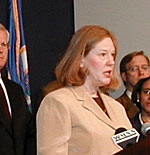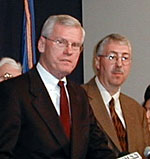By Tim Pugmire
Minnesota Public Radio
June 4, 2002
A survey of Minnesota school districts shows budget cuts for the next school year will top $192 million and cost more than 2,800 employees their jobs. Members of a group representing school boards, principals, superintendents, parents and teachers released the survey results, asking voters to make sure this year's political candidates will support improved funding for public education.
| |
|
|
|
||
The Alliance for Student Achievement, a coalition of 10 education groups, surveyed 279 of the state's 345 school districts to learn the full scope of Minnesota's education funding crunch. Hopkins school board member Barbara Klaas, the alliance's chairwoman, says the projected staff cuts include more than 1,400 teachers, 187 administrators and more than 600 other school workers. She says the layoffs have a direct impact on students.
"Class sizes will be larger. There will be fewer programs for students. Schools are closing, and fees for athletics, music and debate, to name a few, are rising dramatically; all of which will affect student achievement," she said.
Klaas blames the district budget cuts on rising costs and inadequate state funding. She says lawmakers have also funneled too much state revenue into property tax relief rather than classrooms.
Last fall, a record 181 school districts asked local voters for additional tax support, and about two thirds were successful.
Greg Vandal, superintendent of the Sauk Rapids-Rice school district, says voters can help improve public education finances again this November.
|
"A pledge not to raise taxes when we face a $2.5 billion shortfall next session is, in fact, a pledge to cut schools. "
- Carol Johnson, superintendent of Minneapolis public schools |
"The best solution is in electing a Legislature and a governor who understand the needs of our children, as well as the will of our people. Minnesotans have demonstrated at the polling place, and in in any poll that's taken of them, their support for our public schools," he said.
Alliance members want voters to ask each candidate how they'll demonstrate support for public schools, and whether they'd back a minimum three percent annual increase in the basic funding formula.
Carol Johnson, superintendent of Minneapolis Public Schools, says voters should ask candidates if they're willing to support a tax increase, if necessary, to adequately fund education.
"We are not asking people to make a pledge. But a pledge not to raise taxes when we face a $2.5 billion shortfall next session is in fact a pledge to cut schools." she said.
Some education organizations within the alliance also plan to push lawmakers next year for additional taxing authority.
Edina superintendent Ken Dragseth, an official with the Minnesota Association of School Administrators, says school districts want the same taxing options as cities and counties. He says school districts are the only government entity that must get voter approval for financial support.
| |
|
|
|
||
"People don't have a choice on many things, and we come there and it's a chance to say 'no' against government. And we would like the ability for school boards to have some more levy ability than they currently have," Dragseth said.
But other alliance members disagree. They say such levy authority would still cause disparities between property rich and property poor districts. Barbara Klaas of Hopkins says additional state funding is what's needed to prevent more budget cuts next year
"When you go community by community, then there are differences in ability to pay community by community, and whether or not that's supported in those communities, which ends up in a disparity in the educational program between districts. Which is not fair to students in the whole state in terms of we should offer them a consistent and comparable education," according to Klaas.
Klaas says the Alliance for Student Achievement has no immediate plans to endorse political candidates.
More from MPR

